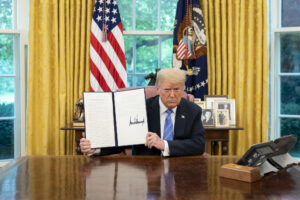We have barely heard it. From Ukraine to the Middle East, the international situation has deteriorated to such an extent that we hardly noticed that last week the 27 Member States began the process of unifying the whole of Europe, the continent of Europe.
Of course, we are not there yet. Russia is clearly not joining us tomorrow, and neither is Turkey. The countries of the Western Balkans will remain in the antechamber for several more years. Nothing will happen overnight, but the favourable opinion that the Commission has just given to granting candidate status to Georgia and to opening accession negotiations with Ukraine, Bosnia-Herzegovina and Moldova will undoubtedly be approved by the Heads of State and Government in mid-December, because the world has changed.
In the same way that the EU opened up to Central Europe when the Soviet bloc collapsed, it is now reaching out to these ten or so new countries, not only because Russia has brought war to Ukraine but also, and above all, because we Europeans face the dual challenge of China and the United States.
Whether the two superpowers of this century come to confront each other or find a way to coexist, in either case they threaten us with a lasting obliteration. Whether they precipitate a world conflict or lay the foundations for a condominium, they are now ready to make us sit at the children’s table and turn us into a museum of our past greatness.
The Union can resign itself to this and accept it. Vladimir Putin, for his part, can choose to subjugate his country to China by pursuing his imperial dreams, but if we want to count, to exist, to defend our freedoms and our social protection, to decide by and for ourselves, we must close our ranks and widen them at the same time.
We did it instinctively. We granted Ukraine candidate country status because not to do so would have been to recognise Russia’s right to reclaim its lost empire, and so we looked beyond Kiev and Europe. We saw Donald Trump and his epigones tempted to make deals with Russia over our heads. We read the polls giving them a chance of returning to the White House. We heard the Balkans wondering whether they, like Serbia, should smile at Vladimir Putin just so that we would open the door to them. We realised that China, Russia and Turkey were taking advantage of our reluctance to enlarge our ranks to attempt to gain or regain a foothold on our borders. In short, we realised that we had to choose between to be or not to be, and we opted for an enlargement that prefigured continental unification.
It is this refusal to abdicate in the face of China and the United States that we will have to make the case for during the European campaign, but although the nobility of the ambition and its necessity will not be difficult to get people to accept, enlargement will be no less frightening.
Enlargement worries many European voters because they know little or nothing about these countries, but they do know that their economies are not on a par with ours and that our institutions would no longer be able to function with so many new Member States.
They are right. It is true. The difficulties of the forthcoming enlargement are formidable, but they are so formidable that it would not and will not be possible to open up the Union as it is today. Even with far-reaching reforms, even with the abandonment of the unanimity rule and the transition to qualified majority voting in all areas, the Union of 27 cannot one day be the Union of 35 or more.
The Union of tomorrow will comprise different levels of integration, several tiers or “formats” as Emmanuel Macron puts it. The whole will be called the “European Union”, but the first tier will be made up of countries united in a common market governed by common rules and respect for the rule of law; the second tier will be made up of countries that accept the single currency and the degree of integration of today’s Union; and the third tier will be made up of those Member States that have decided to harmonise their tax systems and pool their defence and foreign policies.
No one will belong to one of these formats for ever. On the contrary, it will be possible to move from one to the other according to established criteria and, until this change takes place, European unity will have to cement itself in close industrial, economic and political cooperation between the current Union and the candidate countries. This is not an enlargement that the Union is undertaking. It is a revolution.



